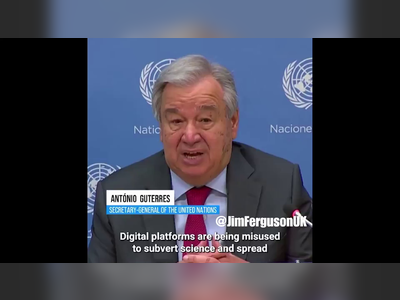Russia's Calculated Energy Strikes: A Psychological Warfare to Break Ukraine's Spirit
The Offensive on Ukraine's Energy Infrastructure Raises Ethical, Humanitarian, and Geopolitical Questions
In a chilling embodiment of modern warfare, recent Russian strikes on Ukraine's energy infrastructure have exposed a strategy that transcends conventional military objectives, veering into a realm of psychological warfare with far-reaching implications.
These attacks, focused explicitly on disrupting civilian energy supplies, are not merely about military gains but about eroding the resilience of a nation’s populace.
Russia claims its intent is to disable Ukraine's military production capabilities, a familiar wartime objective.
Historically, the targeting of infrastructure has been a tactical maneuver aimed at weakening an adversary’s operational capacity.
However, the current strategy diverges sharply; by crippling utilities essential for civilian survival, it borders on a violation of ethical warfare principles.
This tact directly assaults the civilian heart of Ukraine, rendering daily life precarious and complex.
The humanitarian toll of these assaults is staggering.
Essential services have dwindled, leaving millions in Ukraine without electricity, heating, and even water—basic necessities for survival.
This situation poses a profound moral dilemma: can such strategic goals justify immense civilian suffering?
The international community must grapple with this question as the humanitarian cost climbs to astronomical heights.
Moreover, the implications of these tactics extend beyond the immediate conflict, sending ripples through global geopolitics.
If crucial infrastructure can be so effortlessly targeted and disrupted, what lessons do these incidents impart on international security protocols?
Could this set a precedent, reshaping how future conflicts are conducted and how international law adapts to emerging warfare paradigms?
Indeed, the attacks on Ukraine echo Cold War-era strategies, albeit now amplified by sophisticated technology, which escalates the potential for damage and psychological impact.
This begs the question: Are we on the brink of entering a new and harsher era of warfare, where civilian suffering becomes a calculated instrument of conflict?
The international response to such an escalation is critical.
Will we witness a move towards unified peace efforts, pushing for renewed dialogues and humanitarian priorities in conflict resolution?
Or is this a step towards normalizing a brutish form of modern warfare that sidelines human rights?
These are questions that demand contemplation and decisive action, surpassing mere political rhetoric.
At its core, the conflict is a stark reminder that the battles of the future are fought as much on the psychological plane as on physical battlefields.
As we observe this unfolding tragedy, the onus is on the global community to reflect and act, to uphold civilizational values even amidst the harsh realities of war.
These attacks, focused explicitly on disrupting civilian energy supplies, are not merely about military gains but about eroding the resilience of a nation’s populace.
Russia claims its intent is to disable Ukraine's military production capabilities, a familiar wartime objective.
Historically, the targeting of infrastructure has been a tactical maneuver aimed at weakening an adversary’s operational capacity.
However, the current strategy diverges sharply; by crippling utilities essential for civilian survival, it borders on a violation of ethical warfare principles.
This tact directly assaults the civilian heart of Ukraine, rendering daily life precarious and complex.
The humanitarian toll of these assaults is staggering.
Essential services have dwindled, leaving millions in Ukraine without electricity, heating, and even water—basic necessities for survival.
This situation poses a profound moral dilemma: can such strategic goals justify immense civilian suffering?
The international community must grapple with this question as the humanitarian cost climbs to astronomical heights.
Moreover, the implications of these tactics extend beyond the immediate conflict, sending ripples through global geopolitics.
If crucial infrastructure can be so effortlessly targeted and disrupted, what lessons do these incidents impart on international security protocols?
Could this set a precedent, reshaping how future conflicts are conducted and how international law adapts to emerging warfare paradigms?
Indeed, the attacks on Ukraine echo Cold War-era strategies, albeit now amplified by sophisticated technology, which escalates the potential for damage and psychological impact.
This begs the question: Are we on the brink of entering a new and harsher era of warfare, where civilian suffering becomes a calculated instrument of conflict?
The international response to such an escalation is critical.
Will we witness a move towards unified peace efforts, pushing for renewed dialogues and humanitarian priorities in conflict resolution?
Or is this a step towards normalizing a brutish form of modern warfare that sidelines human rights?
These are questions that demand contemplation and decisive action, surpassing mere political rhetoric.
At its core, the conflict is a stark reminder that the battles of the future are fought as much on the psychological plane as on physical battlefields.
As we observe this unfolding tragedy, the onus is on the global community to reflect and act, to uphold civilizational values even amidst the harsh realities of war.
Translation:
Translated by AI
AI Disclaimer: An advanced artificial intelligence (AI) system generated the content of this page on its own. This innovative technology conducts extensive research from a variety of reliable sources, performs rigorous fact-checking and verification, cleans up and balances biased or manipulated content, and presents a minimal factual summary that is just enough yet essential for you to function as an informed and educated citizen. Please keep in mind, however, that this system is an evolving technology, and as a result, the article may contain accidental inaccuracies or errors. We urge you to help us improve our site by reporting any inaccuracies you find using the "Contact Us" link at the bottom of this page. Your helpful feedback helps us improve our system and deliver more precise content. When you find an article of interest here, please look for the full and extensive coverage of this topic in traditional news sources, as they are written by professional journalists that we try to support, not replace. We appreciate your understanding and assistance.











